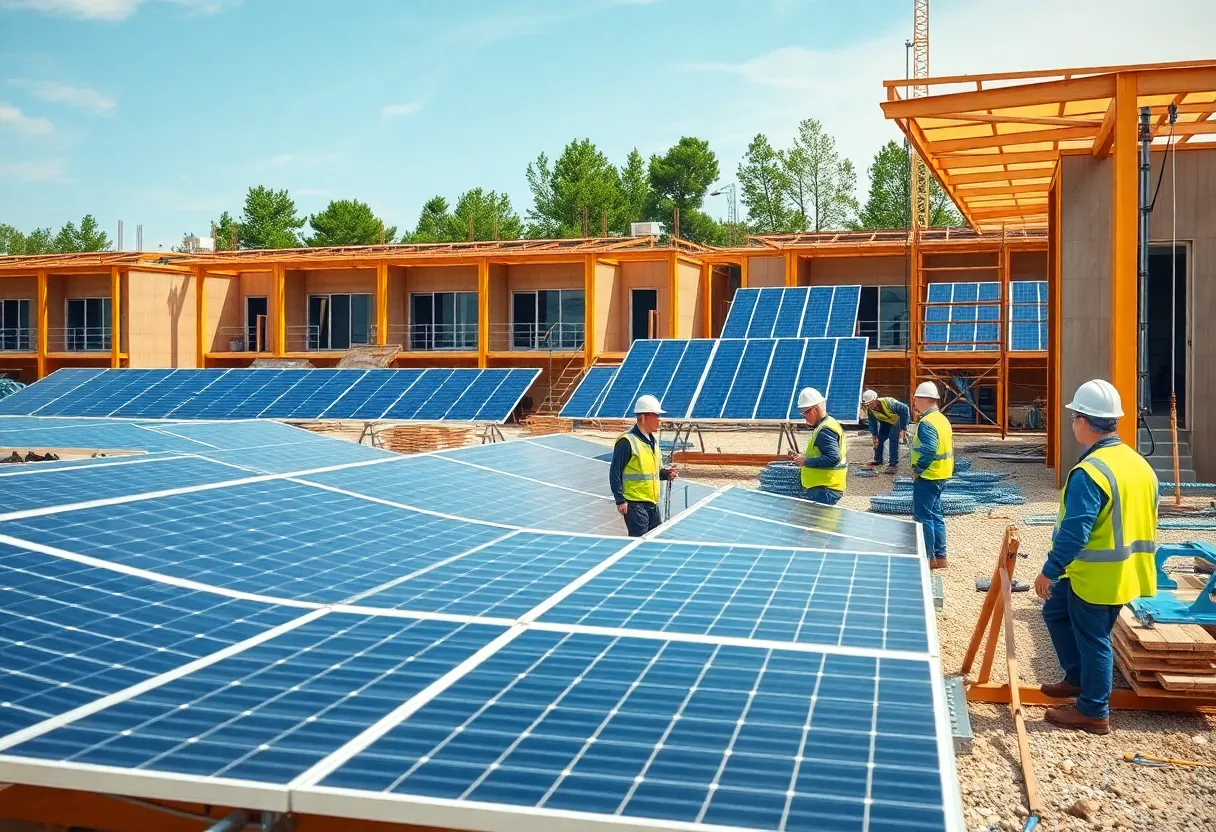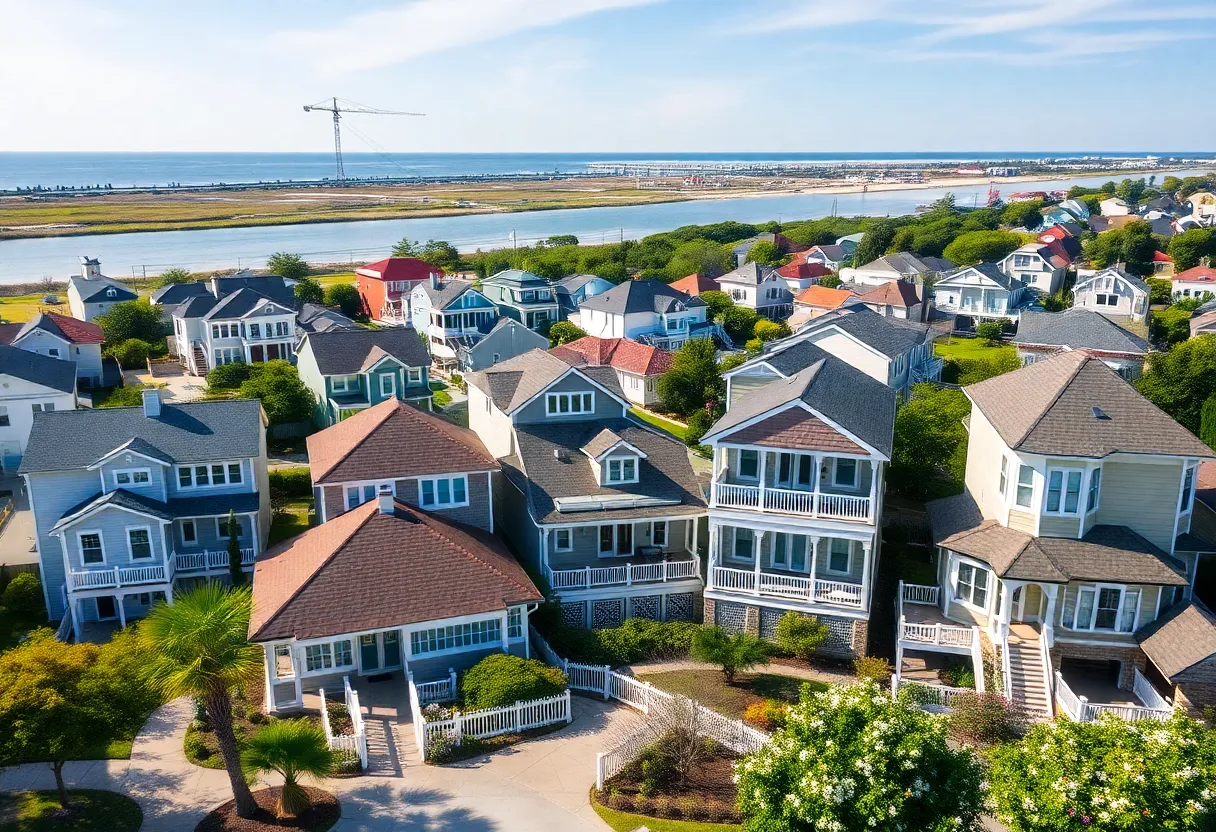News Summary
The construction industry is facing significant challenges due to fluctuating tariffs, slow adoption of new technologies, and rising demands for renewable energy projects. Tariff volatility affects material costs, while outdated project management tools hinder project execution. Community opposition to renewable projects is also increasing, complicating infrastructure developments. Strategies like modular construction and efficient permitting processes are emerging to address these issues, emphasizing the need for proactive engagement and technological integration in the evolving landscape.
Construction Industry Faces Significant Challenges Amid Tariff Fluctuations and Technological Advances
Washington D.C., the construction sector is currently grappling with a series of complex challenges that threaten to impact project timelines, costs, and overall industry dynamics. These issues include volatile tariffs impacting raw material prices, slow adoption of advanced project management tools, and an evolving landscape of renewable energy demands and infrastructure developments.
Tariff Volatility Raises Risks for Construction Projects
One of the most pressing concerns for the industry is the unpredictable nature of tariffs on essential construction materials. Tariffs on commodities such as lumber, steel, copper, and renewable energy components have experienced frequent fluctuations, complicating budget planning for contractors and developers. To mitigate these financial risks, industry experts recommend updating construction contracts to include provisions like price escalation clauses and force majeure clauses. These contractual adjustments aim to provide flexibility when tariffs rise unexpectedly, helping to prevent disputes and project delays.
Prior to signing new agreements, thorough review of contractual terms is essential. Stakeholders must understand how tariffs could influence the costs of materials and how contractual clauses will respond if prices increase, ensuring greater resilience against market volatility.
Persistent Use of Outdated Tools Hampers Complex Project Completion
Despite technological advancements, a significant portion of the construction workforce continues to rely on outdated project management tools. Data indicates that approximately 27% of industry professionals still depend on methods like emails and spreadsheets rather than dedicated project management software or digital collaboration tools. This reliance on antiquated systems can hinder the coordination and execution of complex projects, such as AI data centers, which demand meticulous planning, real-time updates, and integrated communication channels.
Adoption of modern management technologies is increasingly viewed as necessary to streamline operations, reduce errors, and improve project timelines, especially in high-stakes environments like data infrastructure development.
Renewable Energy Projects and Community Opposition
The Frasier Solar Project Overcomes Local Challenges
In Ohio, the Frasier Solar project—a 120 MW solar agrivoltaics facility—recently secured final approval after overcoming community opposition and misinformation campaigns. The project’s approval highlights the importance of local engagement and informational outreach in permitting renewable projects.
Nationwide, opposition to solar farm developments has grown, with a documented 32% increase in public resistance between 2023 and 2024. Concerns from local communities often center on environmental impacts, land use conflicts, and economic considerations.
Major Renewable Projects and Corporate Involvement
A notable example of large-scale renewable infrastructure is a $900 million, 600 MW solar farm near San Antonio, Texas. This development is set to supply all its electricity to Meta Platforms’ data centers under a long-term contract beginning in 2027. Such projects reflect a broader industry trend where technology companies, including Meta, Amazon, and Google, are proactively investing in renewable energy sources to power their expanding data center operations.
Demand for renewable energy among these firms is soaring, driven by goals to operate sustainably and achieve net-zero emissions. Meta’s recent renewable energy agreements with Invenergy have resulted in the procurement of roughly 1,800 MW of clean energy across multiple states, including Ohio, Arkansas, and Texas.
Accelerating Data Center Development and Community Resistance
With artificial intelligence (AI) technology advancing, data center power demand is projected to double or triple by 2028. This surge presents challenges related to site selection and gaining community acceptance. In Virginia, grassroots opposition successfully halted plans for a 2,200-acre gas-powered data center, reflecting growing local resistance to large infrastructural projects in their regions.
Leading tech firms like Meta are pursuing ambitious data center projects, such as Hyperion in Louisiana—a multi-gigawatt AI-optimized facility aiming for 5 GW of computational power by 2030. The development involves substantial utility infrastructure investments, including a $1.2 billion 100-mile transmission project, to ensure stable power delivery to its critical operations.
Similarly, Meta’s Ohio project, Prometheus, is designed to facilitate AI model training at a large scale and is expected to be operational by 2026. These developments underscore industry efforts to meet growing digital demands, though they are increasingly scrutinized by local communities concerned about environmental and economic impacts.
Emerging Construction Strategies and Future Outlook
In response to the industry’s evolving landscape, modular construction techniques are gaining traction, especially in higher education institutions aiming to meet tight construction schedules with minimal campus disruptions. Currently accounting for more than 5% of total U.S. construction activity, modular methods are viewed as a flexible and efficient alternative to traditional building approaches.
Meanwhile, permitting efficiency varies significantly across the country. Florida, North Carolina, and Virginia rank among the top states for construction permitting speed, facilitating faster project initiation. Conversely, Pennsylvania and West Virginia lag behind, experiencing longer approval timelines. This disparity influences project planning and site selection, especially for high-stakes infrastructure like renewable energy facilities and data centers.
Conclusion
The construction industry is navigating a complex mix of external challenges—including tariff fluctuations, community opposition, and technological shifts—that will shape its development trajectory. As demands for renewable energy and digital infrastructure grow, projects must adapt through strategic contractual planning, technological integration, and proactive community engagement to succeed in this dynamic environment.
Deeper Dive: News & Info About This Topic
HERE Resources
Man Dies After Being Trapped by Heavy Rock in Minershaft
New Britain Struggles with School Transportation for Special Needs Students
Evergreen Public Schools Delays Start Due to PSE Union Strike
Eliza Hope Foundation Expands Therapy Center to Better Serve Children with Autism
Labor Day Boost Energizes Virginia Beach Businesses Amid Summer Challenges
Altadena, California — Construction and Housing Market Faces Uncertainty Amid Tariff Discussions
Construction Delays and Workforce Shortages Impacting Projects
Northern Virginia Sees Major Business Relocations and Economic Growth
Safety Concerns Lead to Cancellation of High School Football Game
Virginia Highway Travel Boost During Labor Day Weekend as VDOT Suspends Major Work Zones
Additional Resources
- JD Supra: The Site Report – Construction Industry
- Wikipedia: Construction Industry
- ESG Today: Meta Secures Nearly 800 MW of Renewable Energy
- Google Search: Renewable Energy Construction
- Dispatch: Data Center Project in Ohio
- Google Scholar: Data Centers Construction
- Carbon Credits: Meta Powers U.S. Data Centers
- Encyclopedia Britannica: Data Centers
Author: STAFF HERE VIRGINIA BEACH WRITER
The VIRGINIA BEACH STAFF WRITER represents the seasoned team at HEREVirginiaBeach.com, your trusted source for actionable local news and information in Virginia Beach, Virginia Beach City, and beyond, delivering "news you can use" with comprehensive coverage of product reviews for personal and business needs, local business directories, politics, real estate trends, neighborhood insights, and state news impacting the region—supported by years of expert reporting and strong community input, including local press releases and business updates, while offering top reporting on high-profile events like the Virginia Beach Neptune Festival, East Coast Surfing Championship, and military homecoming celebrations, alongside key organizations such as the Virginia Aquarium, Virginia Beach Convention Center, and Oceana Naval Air Station, plus leading businesses in tourism and defense like Busch Gardens and Northrop Grumman, and as part of the broader HERE network including HEREWilliamsburg.com, providing credible, in-depth insights into Virginia's vibrant landscape. HERE Virginia Beach HERE Williamsburg





